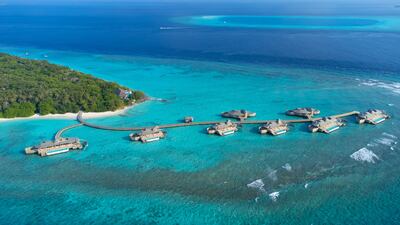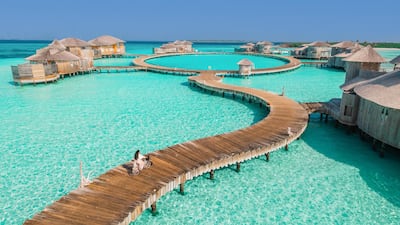Thirty-something years after introducing its “barefoot luxury” concept, which sparked countless copycats worldwide, Soneva, a resort chain founded in the Maldives, retains its distinctive aura of effortless cool. As well as pioneering the kind of laid-back perfection that, for most of us, exists only in our dreams, the brand is synonymous with a level of self-care that extends to the cellular level, but I will get to that later.

Launched in 1995, Soneva Fushi is the original property in the company’s portfolio. It sits on the Maldivian island of Kunfunadhoo in the Baa Atoll, which is part of the Unesco World Biosphere Reserves.
Founded by husband and wife team Sonu and Eva Shivdasani (a portmanteau whose names gave the company its identity), the hotel opened the same year as the couple launched luxury hospitality group Six Senses.
While the latter was sold in 2012, the pair focused on expanding the former, opening Thailand’s Soneva Kiri in 2009 and a second Maldives property, Soneva Jani in 2016 within the Noonu Atoll. This year, a third Maldives site, Soneva Secret, opened, described as a “barefoot paradise.” The brand also counts the private yacht Soneva in Aqua as part of its portfolio.

Famous for its “no shoes, no news” mantra, where footwear is ceremoniously removed and put aside as soon as guests step off the seaplane, Soneva is a place where guests can unplug from the stresses of modern life and embrace a slower, more peaceful existence.
Arriving for dinner in swimwear will not raise any eyebrows at Soneva, and bicycles are the main form of transportation on the islands. The place is steeped in luxury but in an easy, unfussy sort of way.
While slowing down, guests are encouraged to think about their health, both physically and mentally. The hotel is a destination where visitors can (and do) lounge by the pool all day, and it provides access to medical experts, therapists, and wellness practitioners with bespoke treatment programmes.
A variety of experiences, from acupuncture to vitamin intravenous drips, are available on-site, indicating that many of Soneva’s guests are focused not only on relaxation but also on enhancing their well-being.
Nestled within the lush tropical foliage of each Maldives resort lies Soneva Soul, a focal point for a range of treatments, including sound healing, yoga, hydrotherapy and the ancient Indian practice of Ayurveda, through to the ultra-modern hyperbaric oxygen therapy and, new this year, stem-cell therapy – regarded as the future of personalised medicine.
Offering what it describes as a blend of “thousands of years of ancient healing wisdom with modern science and innovation”, Soneva Soul gives its guests a holistic reset and recharge.

Soneva Fushi and Soneva Jani’s villas are what dreams are made of, spacious and airy, decorated in soothing neutral tones and built using natural materials wherever possible, with the wood – including reclaimed telegraph poles – and bamboo left unvarnished to bleach naturally in the sun. Driftwood salvaged from the beach, meanwhile, is turned into sculptures.
Numerous windows help guests connect with nature, affording views of the sea and omnipresent green foliage that is so dense you can almost smell the oxygen it generates.
Many villas come with water slides to whisk you straight into the impossibly turquoise sea, and to top it off, each room comes with its own Barefoot Guardian, a butler, who will seamlessly arrange every aspect of your stay, from floating breakfasts in the swimming pool to ferrying you to evening sundowners.
At Soneva Jani there is an outdoor cinema, with its screen propped on stilts above the water, as well as paddle boards and snorkelling gear free to grab and go. Those with an adventurous side can book a diving trip or, for a more relaxed outing, sunset cruises set sail most evenings offering the potential sighting of playful spinner dolphins. In-house marine biologists also get on board to offer insights and information.

The food, meanwhile, is fresh – either straight out of the sea, or the kitchen garden – and cooked by skilled chefs, while the home-made ice cream parlour is open around the clock. Combine all these factors and it begins to become clear why Soneva is not only world-famous, but boasts a guest return rate of about 50 per cent. Clearly, it is tapping into something more significant than just a pretty view.
Crucially, Soneva’s philosophy of caring does not stop there. As residents of the Maldives since 1990, the Shivdasanis are in tune with the significant impact tourism is having on the archipelago, both positive and negative. While the industry has created jobs across the 180 or so inhabited islands, those same hotels and resorts are now contributing copious amounts of waste, with 330 tonnes per day being disposed of.
Soneva is making a concerted ecological effort; rather than shipping its rubbish out of the resort, it has constructed on-site processing plants at each property to sort and reuse as much as possible. Food waste is heated to become fertiliser, a process that also kills off nasty pathogens before being spread on the surrounding vegetation.
Glass is collected and melted down to make water bottles (Soneva banned plastic ones in 1998) and drinking glasses, which are used across the villas and restaurants. Some will also be made into vases and artworks for guests to buy.
Drink cans and metals, meanwhile, are melted down to be used in villas, while paper and cardboard are sent off-site for recycling. Everything else that can be salvaged is removed, and only the remainder is consigned to landfill. To promote transparency, guests are invited to visit the glassworks and can even sign up for glass-blowing lessons.
Set up to help local communities manage their refuse, Soneva Namoona is a partnership between Soneva Fushi and neighbouring island communities. Also looking to improve quality of life is Soneva Foundation, which runs various programmes, including reforestation, mangrove planting and supplying wood-free stoves to vulnerable communities.
To date, it has planted 900,000 treesin Mozambique and 1.5 million mangrove trees in Myanmar, all funded by a two per cent levy on Soneva guests. In the Maldives, it is actively replanting coral, including 50,000 fragments displaced by construction around the archipelago, as well as rehoming 20,000 coral colonies, all nursed back to health using Mineral Accretion Technology tables, with the aim to grow and replant as many as 150,000 coral fragments per year.

Yet, while Soneva has every right to be preachy about its social and environmental record (I haven’t even touched upon the work they do to support local orphans), like with everything else, it seems to favour a quiet, laid-back approach.
The Soneva way feels less about shouting and more about actually doing, which is a notable thing in itself. Like with the symbolic removal of shoes on arrival, it seems happy to let small, meaningful actions do the talking, from the in-house astrologer, who is there to explain the night sky, to meals prepared from the kitchen garden.
Soneva espouses a way of living that is mindful and treats each moment as a gift. And perhaps this really is the greatest luxury of all.






